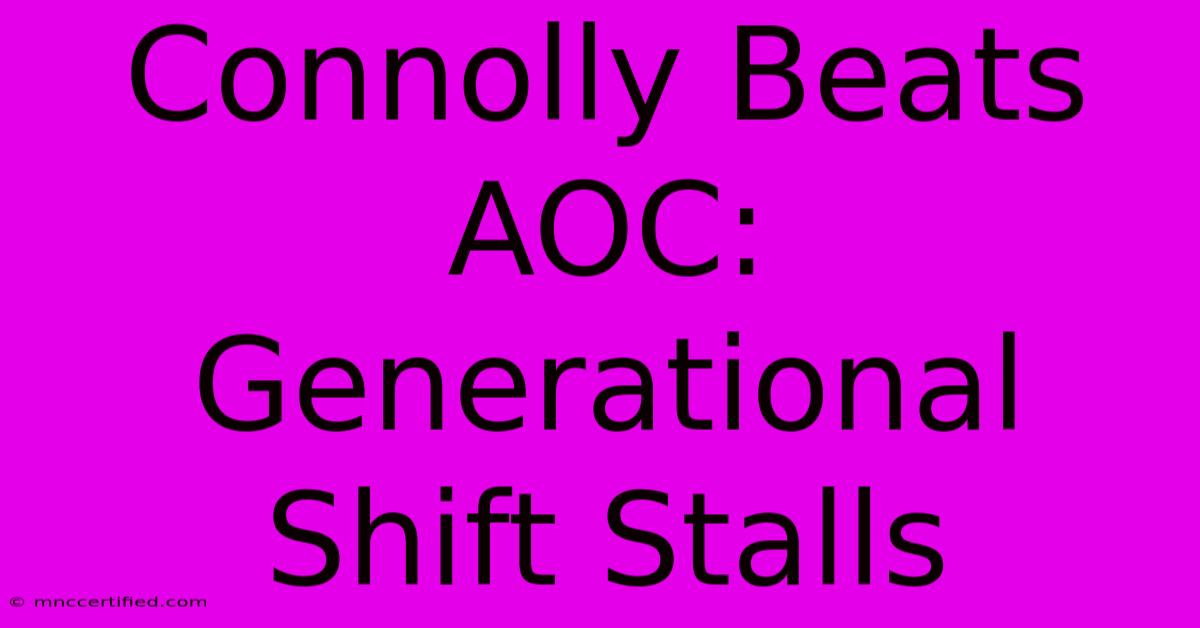Connolly Beats AOC: Generational Shift Stalls

Table of Contents
Connolly Beats AOC: Generational Shift Stalls
The recent New York primary results, showcasing the victory of Mike Connolly over Alexandria Ocasio-Cortez (AOC), have sent shockwaves through the political establishment. While AOC remains a prominent figure, Connolly's win signifies a potential stalling of the anticipated generational shift in American politics. This unexpected outcome prompts a deeper examination of several factors contributing to this surprising upset.
The AOC Phenomenon: A Shifting Landscape
AOC's meteoric rise in 2018 redefined progressive politics. Her outspoken advocacy for policies like the Green New Deal and Medicare for All resonated with a younger generation yearning for political change. Her massive social media following and highly effective communication strategy made her a global icon, seemingly unstoppable. However, the Connolly victory suggests a more nuanced reality.
Beyond the Hashtag: Ground Game Matters
While AOC's digital presence remains unmatched, Connolly's campaign focused heavily on a traditional ground game. This included extensive door-knocking, community outreach, and building strong relationships with local constituents. This grassroots approach highlighted a crucial aspect often overlooked in the digital age: direct engagement with voters remains vital for electoral success, even for the most digitally savvy candidates. Connolly effectively bridged the gap between online visibility and tangible, on-the-ground campaigning.
The Appeal of Moderation: A Shifting Electorate?
Connolly's campaign leaned towards a more moderate stance on certain issues, particularly concerning economic policy. While still progressive, his platform avoided some of the more radical aspects of AOC's agenda. This might suggest a segment of the electorate, even within the progressive wing, desires a more measured approach, questioning the feasibility or potential consequences of some of the more ambitious proposals. This subtle shift in voter preference warrants further investigation.
Generational Divide or Strategic Shortcomings?
The narrative of a generational shift stalling might be an oversimplification. AOC's loss isn't necessarily a rejection of her ideology, but rather a demonstration of the complexities of modern political campaigning. Factors beyond generational preferences played a significant role.
Campaign Strategy and Resource Allocation: A Critical Analysis
The effectiveness of AOC's campaign strategy is subject to scrutiny following Connolly's win. While her digital reach was vast, the translation of that online engagement into votes may have been less effective than anticipated. Connolly's superior ground game and perhaps more targeted resource allocation may have played a decisive role. Analyzing the campaigns' expenditure and strategic choices is vital to understand the outcome fully.
The Impact of Local Issues: Beyond National Narratives
National political narratives often overshadow local concerns. Connolly's success might be attributed to his ability to connect with voters on issues directly affecting their daily lives, beyond the broader national political dialogue. This emphasizes the importance of tailoring campaigns to specific local needs and anxieties.
Looking Ahead: The Future of Progressive Politics
Connolly's victory does not signal the end of progressive politics, but rather a call for recalibration. While AOC remains a powerful voice, her loss highlights the need for a more comprehensive campaign strategy that balances online engagement with traditional grassroots efforts. The future of progressive politics necessitates a deeper understanding of the evolving electorate and the necessity of adapting to the changing dynamics of political engagement. The victory serves as a valuable lesson for future campaigns, emphasizing the importance of a nuanced approach that transcends simplistic generational divides. Further research is needed to fully understand the implications of this election result and its broader impact on the political landscape.

Thank you for visiting our website wich cover about Connolly Beats AOC: Generational Shift Stalls. We hope the information provided has been useful to you. Feel free to contact us if you have any questions or need further assistance. See you next time and dont miss to bookmark.
Featured Posts
-
Mc Coist Menzies Call Rangers News
Dec 18, 2024
-
Menzies Championship Winning Words
Dec 18, 2024
-
Today Show Bids Farewell To Mishal Husain
Dec 18, 2024
-
Arteta Carabao Cup Win Trophy Springboard
Dec 18, 2024
-
Mc Gregor Delays Mma Comeback Fight Set
Dec 18, 2024